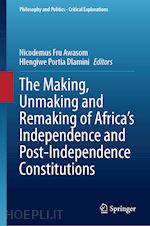
Questo prodotto usufruisce delle SPEDIZIONI GRATIS
selezionando l'opzione Corriere Veloce in fase di ordine.
Pagabile anche con Carta della cultura giovani e del merito, 18App Bonus Cultura e Carta del Docente
This book provides a collection of chapters that critically explore the making and development of Africa’s independence constitutions through the different phases in their full generality. Since independence, various constitutions from African countries have undergone a succession of changes, triggered by either the domestic or international environment or both. These processes constitute autonomous epochal ‘waves’ or ‘phases’ of constitution-making which need to be unpacked, historicised and explored in a systematic manner. This work, intended as a distinctive object of positive analysis, historicizes the independence constitutions of selected African states on either a country-specific or a comparative basis. A historical approach to the continental study of constitutions is rare, meaning the continental coverage of the book is justified by Africa’s rich diversity reflected in its multiple monarchical and colonial backgrounds. The book is of interest to academics interested in having a panoramic view of Africa's constitutional development from a historical perspective.
Chapter One General Introduction.- Chapter Two The Trajectory of Presidential Monarchism in Post Colonial Africa.- Chapter Three The Processes of Making Ghana’s Independence Constitution and the Triumph of the Unitary State Model.- Chapter Four The Making of Ghana’s Fourth Republican Constitution, Power Alternation and Stability.- Chapter Five The Politics of Constitution Making In Zambia 1964 2021.- Chapter Six The 1961 Constitution, Race, and Political Realignments in Colonial Zimbabwe.- Chapter Seven The Permanent Transition of Post-Colonial Constitution Writing in Sudan’s First and Second Republic.- Chapter Eight The Problematics of Fiscal Federalism in Post-Colonial Nigeria.- Chapter Nine Constitutional Development in Post Independence Francophone West Africa A Comparative Case Study of Senegal and Co^te d’Ivoire.- Chapter Ten Independence Constitution-Making in the Kingdom of Eswatini and the Triumph of Traditionalism.- Chapter Eleven Constitutionalism in Morocco The Making of Kings’ Constitutions.
Nicodemus Fru Awasom was born and educated in Cameroon and Nigeria and is currently a Professor of African History in the University of Ghana. He is a holder of a Doctorat and a PhD degree in history from the University of Yaoundé and Ibadan respectively. He is an academic of international standing with decades of teaching experience in several universities in Africa and Europe, and with a track record of publications in peer review journals in Africa, Europe, Canada and the USA. His research focuses on constitutional history, research methods, the Nomadic Fulani problem in Cameroon, and comparative African historiography. He edited a book on Youth and Identity in Africa (forthcoming CODESRIA: Dakar).
Hlengiwe Portia Dlamini is currently a Senior Lecturer in the University of Eswatini and obtained her PhD from the University of Pretoria in 2016. Her BA and MA degrees were obtained from the University of Swaziland. Her research concentration is Constitutional History and the governance of public spaces in Eswatini (Swaziland). She is working towards publishing a book on Eswatini’s constitutional history. She has also been researching the constitutionality of community policing and is exploring the constitutionality of women, enfranchisement and disenfranchisement, and Gastronomic Injunctions (Halaal) of Islamic minorities in Eswatini since independence.











Il sito utilizza cookie ed altri strumenti di tracciamento che raccolgono informazioni dal dispositivo dell’utente. Oltre ai cookie tecnici ed analitici aggregati, strettamente necessari per il funzionamento di questo sito web, previo consenso dell’utente possono essere installati cookie di profilazione e marketing e cookie dei social media. Cliccando su “Accetto tutti i cookie” saranno attivate tutte le categorie di cookie. Per accettare solo deterninate categorie di cookie, cliccare invece su “Impostazioni cookie”. Chiudendo il banner o continuando a navigare saranno installati solo cookie tecnici. Per maggiori dettagli, consultare la Cookie Policy.